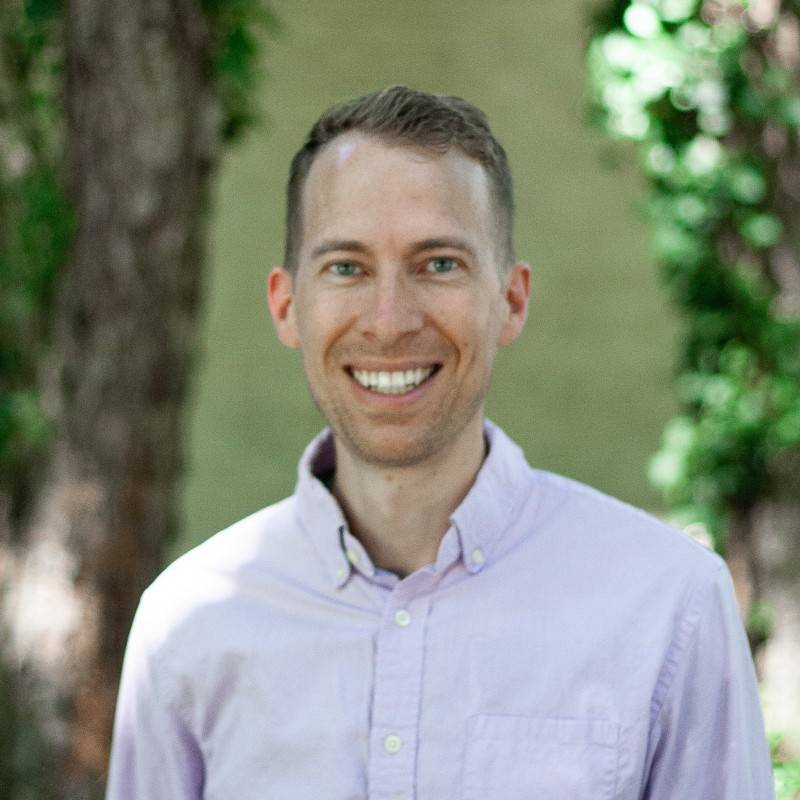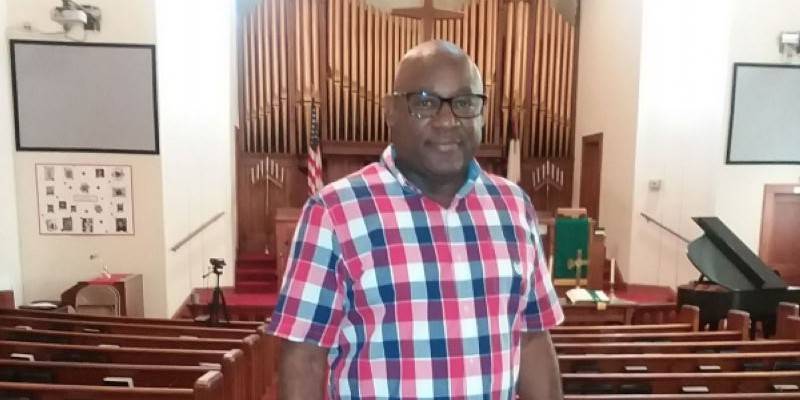I spoke with Reverend James Fielder last fall as he discussed cross-cultural ministry as an African American pastor leading a predominantly white United Methodist congregation in Bement. This is our first conversation with Jonathan King as he represents Urbana Theological Seminary.
This article in particular reminds us that COVID-19 does not spare clergy or their families; particularly African American families that are being disproportionately impacted by the pandemic.
I hope this installment also reminds us that seminaries like UTS, by way of online courses, community workshops and online prayer gatherings and presentations, can play a vital role in supporting this community during this pandemic.
I am currently completing my first course at UTS and I have been profoundly and enjoyably challenged intellectually and spiritually by the rigorous instruction, devoted faculty and staff and the ongoing online offerings to support the student community in the midst of this pandemic.

Photo provided by Jonathan King.
Smile Politely: How are you and your family doing?
Jonathan King: By God’s grace, our family is doing well. We are grateful to have employment and food on our table. For the first couple weeks, honestly, amid the uncertainty of the global existential crisis, it heightened my senses. I was feeling a surge of hope and joy as our mortality was confronted. I also felt an increasing sadness due to the loss of incarnated community and the way that this crisis was affecting the particularly vulnerable among us.
Like many others, I am adjusting to a new rhythm of life centered around my home. For our family, that includes two adults and three young children. My wife and I have attempted to keep some structure for our sake and our children’s sake as we share the responsibility of childcare and homeschooling. On Sundays we are attempting to go screen-free because our other days have become more filled with screens as we do more learning and socializing through our connected devices.
James Fielder: Right before the pandemic became full-blown, my dad was admitted to the hospital for congestive heart failure. A few days later, my mom was also admitted to the hospital. Additionally, my daughter was admitted to the hospital with pneumonia. Due to social distancing and shelter in place, I was not allowed to visit any of them. I had to trust God and the medical staff of the various facilities that they were in presently. My daughter had COVID-19 and is now doing well today. My mom is in a rehab facility, and now is doing much better today as well. I believe that the “God of the in-between” worked those miracles for my family and me. I found out this morning that my dad also has COVID-19. During these past few weeks, my church has sent me prayers and cards to uplift me as I have continued to preach the word of God to them. I welcome the prayers of those of you who may read this article. I believe that the “God of the in-between” will continue to have his perfect will in my life. And I pray for my dad and the medical staff that is presently taking care of him.
SP: Jonathan, how has required social distancing and sheltering in place changed the UTS academic community?
King: At UTS, we seek to provide a safe and thoughtful space for students to grapple with the implications of the Christian message, and a crisis like this only further deepens our convictions that providing a community where individuals can ask honest, tough questions about God, the Bible, ethics, faith, etc., is paramount. Guiding and training individuals to humbly and faithfully embody the Biblical narrative of hope and redemption in their lives and in our world — that is a calling worthy of our attention and perseverance.
Before the pandemic, our school was composed entirely of face-to-face instruction. Now, along with many other institutions, we’ve made swift adjustments so that all of our classes and faculty, staff and board meetings can continue online. We’ve been forced to make an accelerated progression into twenty-first century learning environments, which is probably a good thing in the end. We have also closed our office and library, so there is still a disconnectedness from our mission which can easily loom for all of us. Lastly, we are attempting to compile a weekly series of blog reflections on COVID-19.
SP: James, how has required social distancing and sheltering in place changed your congregation?
Fielder: After hearing the shelter in place directives, I started thinking about methods to not only have a church but also to stay connected as a church community. Therefore, I have seen my current congregation continue to have the desire to hear the word of God, continue to have the desire to be prayed for and nurtured. However, additionally, I have seen my personal reach go from 50-75 people Sunday morning, to roughly 300-600 people logging into Facebook live on Sunday morning. Members of my congregation have been sharing the live recording with family members across the country. Periodically, I have hosted a Facebook live prayer session, and seen people logging in for a word of prayer. I would say that there is a strong desire to hear a word of hope.
Additionally, this has allowed me to hear the messages from my brothers and sisters in other church communities, because we are all streaming in some way. Rather than turning in to listen to the more famous pastors, I get to hear from my friends, and that is encouraging. In the United Methodist Church, we talk a lot about “the connection,” and I have seen more connected now under leveraging the technologies that are available to us today.
Ultimately, I have my church extend itself beyond our church walls. However, I have also seen the church at large, become more of THE CHURCH as a whole, as opposed to strictly individual communities.
SP: What advice would you give to those in our community struggling with questions of faith in this moment?
King: This is an unprecedented time for most of us, the world over. We are in solidarity with one another in a way we haven’t quite experienced and in a way that we can’t entirely name yet. The story is still unfolding.
An unwelcome visitor has suddenly forced his way into our lives — bringing suffering from the loss of health, loss of loved ones, loss of social cohesion, loss of employment, loss of childcare services, loss of food security, loss of rituals. And, of course, many in the healthcare industry are working under an added load on top of the normal pressure of an already emotionally-taxing profession. Even for those who have not suffered a major loss, the upheaval of personal and societal norms mixed with the deluge of disquieting COVID-19 media has opened the door to new levels of anxiety, loneliness, depression and restlessness for many.
There are no easy answers during a crisis like this. Faith in a good God is not a panacea to inoculate us from suffering and grief. There is a lot that doesn’t make sense right now.
It is quite understandable that during this time of upheaval and loss many are discovering a newfound resilience and hope through their faith in God, while many others are questioning why God would allow such suffering on the earth, and, of course, others might see this virus as yet another glitch in the randomness of our brief and meaningless existence.
So, I am not surprised to hear that Google searches for “good news” are trending high these days. I am not surprised to hear that online meetings for faith communities are attracting higher attendance than when they previously gathered en masse in brick-and-mortar. I am not surprised to see the generosity and compassion of many people and communities of faith, like the Italian priest who gave up his ventilator so that another might live.
Yet, because there is a redemptive narrative of hope within which the coronavirus sits as an unwelcome and ultimately impotent participant — COVID-19 will not have the final say on the earth.
This could be a surprising time of strengthening our faith, returning our hearts to our first love, Jesus our Lord. This can be a time of remembering our hope is not in a Sunday morning ritual, but in our Risen King who lives with us. This can be a time of remembering that it is not the responsibility of “the church” to help the poor, the sick, the lonely, but our responsibility as disciples of our Lord Jesus. This can be a time of remembering that our faith is not built upon the leadership of clergy, but we — all of us in Christ — are a Spirit-filled kingdom of priests called to use our freedom to love God, love our neighbor and serve one another.
In the end, with or without COVID-19, we will continue to be mortal, we will continue to groan against the inevitability of death, we will continue to need the comfort of others, we will continue to work in jobs and careers that don’t every fully deliver on our deepest desires for a satisfying life, but, in the Christian community, we will continue to live our lives earnestly in a demonstration of the hope we have in the God who is bringing his shalom to our lives and to our hurting world.
Fielder: Since the pandemic started, I have been preaching more from Lamentations and Psalms that are laments in nature. In my studies of these books, I have found some pervasive themes. One, the writers expressed genuine human emotions. They, the biblical writers, expressed pain regarding either personal or national issues. Their first cry was “ouch, this hurt,” “why is this happening.”
C.S. Lewis wrote the following: “Grief is like a long valley, a winding valley where any bend may reveal a new landscape…We were promised sufferings. They were part of the program. We were even told, ‘Blessed are they that mourn,’ and I accept it. I’ve got nothing that I hadn’t bargained for. Of course, it is different when the thing happens to oneself, not to others, and in reality, not imagination.”
C. S. Lewis went from desolation to a rediscovery of faith in the process of his suffering. Our sufferings should draw us to God and not away from God. I read an article in Christianity Today that stated that we are in the “in-between.” We are between the beginning of the pandemic and the miracle of the cure.
A couple of weeks ago, I led a prayer session which focused on the following passage:
Psalm 23:4 (NRSV)
4 Even though I walk through the darkest valley, I fear no evil; for you are with me; your rod and your staff — they comfort me.
My focus for the prayer session was the word “through.” I stated that we are going through the valley, we are not staying in the valley. This is my mindset regarding this period.
———–
Sadly, Rev. Fielder’s father — Rev. James Fielder Sr. — passed away on April 21st of congestive heart failure and COVID-19. Please keep the Fielder family and Bement United Methodist Church congregation in your thoughts and prayers during this time of bereavement.








